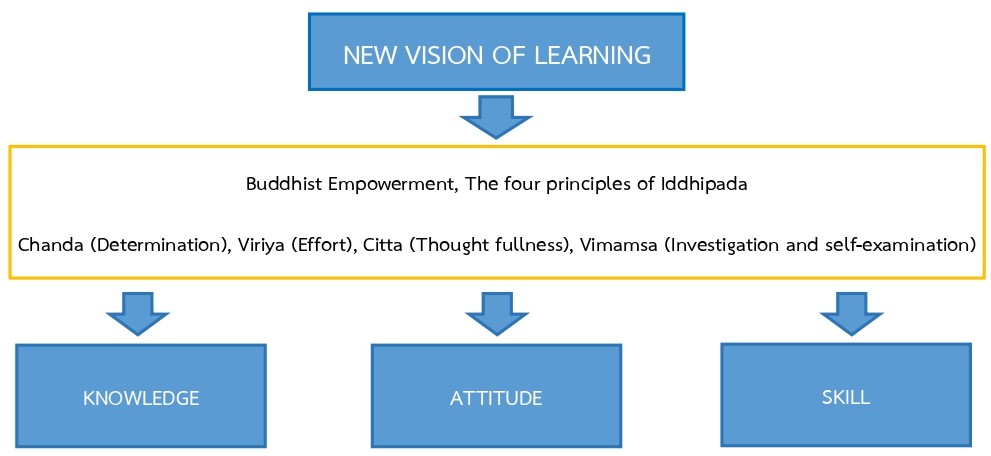AN INVESTIGATION OF UNDERGRADUATE STUDENTS' ATTITUDES TOWARDS STUDYING ENGLISH AS A SPECIALIZATION: A CASE STUDY OF THAI EFL STUDENTS AND A CONSIDERATION OF THE ROLE OF THE FOUR PRINCIPLES OF IDDHIPADA
Keywords:
Undergraduates, Attitudes, English, Specialization, The Four Principles of IddhipadaAbstract
Background and Objectives: English is an international language spoken in many countries. In addition, almost every country in the world teaches the English language in schools and colleges. In Thailand, English is taught and learned as a foreign language at every level of education. It is widely accepted that attitude and set of beliefs about learning a foreign language, especially English, can influence the efficiency of the students in language classes. The objectives of this study consist of: First, investigating undergraduate students' attitudes towards four main aspects or domains that normally contribute to studying English as a foreign language comprising attitudes towards English-speaking people, emotional attitudes, interest in studying English, and motivational orientation; Second, exploring the significant differences between students' responses according to gender and year of study.
Methodology: The participants in this study were 190 English-majored students from Nakhon Ratchasima Rajabhat University, which included 20 males and 170 females. Among these, there were 44 freshmen, 40 sophomores, 50 juniors and 56 seniors. The research instrument was a questionnaire through which four domains were explored. The SPSS software was used to analyze the data collected from the study participants. A T-test was employed to analyze the significance of the observed differences between male and female students. The Analysis of Variance (ANOVA) was also employed to analyze the significant differences in years of study.
Main Results: The results showed that the students' motivational orientation was the most influential (M = 3.26), which caused them to study English as a specialization. However, it was found that the students were more integratively motivated (M = 3.33) to study this language. Results also revealed that the least influential aspect (M = 2.54) was related to interest in English. Results showed no statistically significant differences (α = 0.05) between the means of students' responses to the other three aspects. The four aspects, according to the year of study, revealed no statistically significant differences (α = 0.05) between the means of all students' responses to each aspect. They had the same or relatively the same attitude, interest, and motivational orientation.
Involvement to Buddhadhamma: The discovery from this research model found that it had the possibility to utilize the knowledge obtained from this study for contributing to the specialization in terms of attitude towards English-speaking people of Thailand, which differed from previous research that did not incorporate religious principles to empower the specialization in terms of attitude towards English. This research related to the application of Buddhism in terms of the four principles of Iddhipada would support undergraduate students' attitudes towards English as a specialization with modern or recent knowledge. The development of such a collaborative classroom fitted with the concepts of the four principles of Iddhipada.
Conclusions: Results showed that students' motivation was the most influential aspect, and interest in English was the least influential aspect, which caused them to study English as a specialization. They also revealed no significant differences according to gender and year of study. The main findings of the study showed that the students were interested and felt the necessity to learn the English language and the causes of learning the language. They especially reasoned that English was international and the link language to share ideas with foreigners. The researcher also concluded that the better motivation orientation to study the four principles of Iddhipada should be given more consideration in the teaching of English in Thailand.
References
Bain, S. K., Mc callum, R. S., Bell, S. A., Cochran, J. I. & Sawyer, S. C. (2010). Foreign language learning aptitudes, attitudes, attributions, and achievement of postsecondary students identified gifted. Jaa, 22(1), 130-156. https://doi.org/10.1177/1932202X1002200106.
Chalak, A. & Kassaian, Z. (2010). Motivation and attitudes of Iranian undergraduate EFL students toward learning English. Gema Online Journal of Language Studies, 37(10), 37-56.
Eshghinejad, S. (2016). EFL students' attitudes toward learning English language: The case study of Kashan University. Cogent Education, 3(1), 1-13. https://doi.org/10.1080/2331186X.2016.1236434.
Fadlalla, E. H. (2017). Students' attitudes and motivation toward English language-Dongola University. International Journal of English and Literature, 7(2), 55-64.
Feng, R. & Chen, H. (2009). An analysis of the importance of motivation and strategy in postgraduates' English acquisition. English Language Teaching, 2, 93-97. https://doi.org/10.5539/elt.v2n3p93.
Jafre, M. Z. (2012). EFL students' attitudes toward learning English Language: The case of Libyan secondary school students. Asian Social Sciences, 8(2), 119-132. https://doi.org/10.5539/ass.v8n2p119.
Lafaye, R. E. & Tsuda, S. (2002). Attitudes toward English language learning in Higher Education in Japan, and the place of English in Japanese society. International Communication Studies, XI(3), 145-161.
Latchanna, G. & Dagnew, W. (2009). Attitude of teachers towards the use of active learning methods. ELT Journal of All India Association for Educational Research, 21(1), 71-82.
Oroujlou, N. & Vahedi, M. (2011). Motivation, attitude, and language learning. Procedia-Social and Behavioral Sciences, 29(2011), 994-1000. https://doi.org/10.1016/j.sbspro.2011.11.333.
Tahaineh, Y. & Daana, H. (2013). Jordanian undergraduates' motivation and attitudes towards learning English in EFL context. International Review of Social Sciences and Humanities, 4(2), 159-180.

Downloads
Published
How to Cite
Issue
Section
License
Copyright (c) 2023 Journal of Buddhist Anthropology

This work is licensed under a Creative Commons Attribution-NonCommercial-NoDerivatives 4.0 International License.








